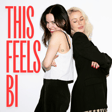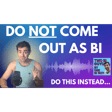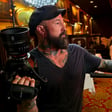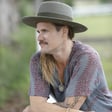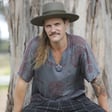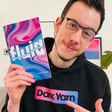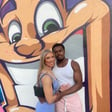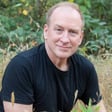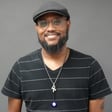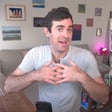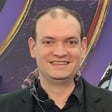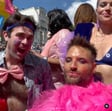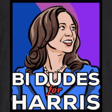Introduction and Coaching Opportunities
00:00:13
Speaker
Hey everyone, welcome back to Two Bye, guys. Thanks for listening. We've got a great interview coming up in a moment, but first I wanted to quickly mention that I still have two spots open for individual coaching at the moment. I am a life coach. I help buy queer and questioning people of any gender, navigate challenges surrounding identity or relationships, or anything else you want to be coached on. I can do anything.
00:00:38
Speaker
There's lots more info about that on my website, RobberBrooksCohen.com. And I also talked more about my coaching practice in the last two episodes of this podcast. So if you missed those, head back and you can listen. Also, I hosted a wonderful group coaching session last week. It went really well. And I'm doing another one this Thursday, May 9th at 4 p.m. Pacific, 7 p.m. Eastern.
00:01:01
Speaker
I'm hoping to start offering these on a more regular basis, at least once a week, maybe even twice a week. So for updates, or if you are listening to this podcast after May 9th, just check out my website or visit to buy guys on Instagram for updates on group coaching. I also learned in that last session that we have to keep the group pretty small and we need enough time for everyone to get a chance to share.
00:01:24
Speaker
So at least for now, the sessions will last up to two hours and I will be capping it at six people. So head over to my website or check the show notes to sign up if you're interested. And if there is enough interest, I will add more sessions. Okay, so now here is my interview with Dr.
Introducing Dr. Lisa Speidel and Her Work
00:01:40
Speaker
Lisa Spydell. Enjoy.
00:01:55
Speaker
Hello, everybody. Welcome back to Two Bye, guys. I'm back continuing the last few episodes of book season, which we didn't finish, and I like to have 10 episodes per season. So we're back interviewing some bye authors with some wonderful new bye books. And today I am so happy to be chatting with Dr. Lisa Speidel. She is an associate professor general faculty in the Department of Women, Gender and Sexuality at the University of Virginia.
00:02:25
Speaker
She's also a certified sexuality educator through the American Association of Sexuality Educators, Counselors, and Therapists, an organization where I may try to go promote my book later this year. Maybe we'll see each other. Her book
00:02:41
Speaker
Uh, The Edge of Sex Navigating a Sexually Confusing Culture from the Margins was published by Rutledge in 2019. I haven't read it yet, it sounds awesome. And her new book will be published very soon in 2024. We'll talk about that. It is called Bisexuality Beyond Binaries, Celebrating Multiple Bisexual Identities in a World of Erasure.
00:03:06
Speaker
Lisa has worked locally and nationally as an educator for over 30 years with a focus on examining the role of masculinity, healthy sexuality, gender-based violence, and the intersection of racism and other forms of oppression, and much more. We'll talk about it all. Welcome to Two Bye, guys. Dr. Lisa Speidel.
00:03:24
Speaker
Yay, thank you. So excited to be here. I know. It's been a long time coming because the way that we met is through our books and through our mutual publisher Rutledge.
Book Collaboration and Structure
00:03:40
Speaker
And you are actually one of the reasons my book got published by them in the first place. Do you want to tell that story?
00:03:48
Speaker
Sure. So part of my work with Rutledge has been to review book proposals and I got to review your book proposal, which was very exciting. And I didn't know about this podcast and so I got to learn all about it. So yeah, that's how
00:04:10
Speaker
I found out about you. And when I started working on this, I was like, Hey, can I contact that person who is doing this book? So
00:04:23
Speaker
Yeah, they kind of went from there. Yeah, I'm so glad Rutledge connected us and that you gave my proposal such a nice endorsement and then we proceeded to publish. And you actually also wrote one of the endorsements on the back cover of the book, a lovely endorsement.
00:04:43
Speaker
So you're right there in the book. You're in my book and now I'm in your book. I contributed to, so your book is like sort of an anthology of interviews about various aspects of my identities and I got to contribute to a few different chapters. I'm excited to see it in print.
00:05:05
Speaker
Yeah, so it's a little bit of a different format than the edge of sex, which was just an anthology. This one has 13 chapters, you know, 13 topics and that I'm writing or I've written and
00:05:21
Speaker
a couple personal narratives in each of them. So I doubled the work and I'm down on authors. It's a co-author of the previous book. So it's a very, as you well know, it's a very
00:05:36
Speaker
Huge undertaking. I was going to say, but writing and publishing a book is so easy. So it's natural that you wanted to make it more difficult for yourself to add more work to it and do it all by yourself. Yes, yes. I just needed more work. And I kept expanding. You connected me to people, and then they connected me to people. And I was like, oh, this went from 15 people to 34 people. So it's exciting.
00:06:05
Speaker
I just wanted to add even more to your workload. Yes, please. No. It all made it better. Good, good. And I'm so excited to see it come out. So this is a book that isn't out yet. I haven't read the whole thing. I've read some chapters that you sent me. I've reread what I said, which when I read it, I was like, oh, that sounds kind of good. I don't remember saying that. Sounds really good. That makes sense.
00:06:32
Speaker
Uh, which I have sometimes people post like a page from my book on Instagram and I read it like as if I have a bad memory and I'm like, Oh, that makes sense. Oh, I wrote it. Yeah. Oh, I'm kind of smart. Like, let me like that. And then then I realized that was me. Um, so yeah, when is so when is the book? We'll get to more about the book in a minute, but when what stage are you at and when will it be published?
00:06:58
Speaker
Yeah, final manuscripts going in soon. And by the end of the year is the plan. As you know, that's a good process. Once you get it in, it still is another six months. So yeah, the plan is by the end of the year. And yeah, I'm excited because it's been, like I said, it's been a process. It's not an easy process.
00:07:28
Speaker
Yeah. And yeah, I learned about all that and had some nice guidance from you when we talked to help me through that process because I had never done it before. So yes, I appreciate it. Okay. Yeah, you can help me. Yeah. Yes. Well, everybody go pre-order the book. It's called Multiple Bisexuality Beyond Binaries. Okay. So before we get more into the book,
00:07:53
Speaker
I always ask on whatever spectrums you're willing to identify, how do you identify and why are those identities important to you?
Identity and Influence on Work
00:08:05
Speaker
Yeah, well, I identify as bisexual, so that is part of a contributing factor to the creation of this book. I'm cis, I'm white, I'm, I guess, past middle age.
00:08:24
Speaker
I don't know if I could live to be 110, I'm middle age. Um, so yeah, those are, those are sort of the main identities. I'm a mom, um, which is a big part of my identity too. My identities. Yeah. How many kids do you have? I have one. Cool. One kid is about almost 14. Cool.
00:08:51
Speaker
So I haven't read your first book. Tell us a little about like what led to writing that first book and then what's happened in the meantime that led you to write this one.
00:09:04
Speaker
Yeah, the interesting thing is actually for both of them, it has been my students that have motivated both books. So I teach human sexualities and I teach a class called Pleasure Activism. And both of those classes, well, all of my classes, my students do a lot of reflective writing.
00:09:27
Speaker
And so it's very personal. I was just talking to a student recently and he was like, I don't know what it is about your classes, but I tell you things that I wouldn't tell anybody else. And there are such moving stories from people and I'm so honored that they will be that open with me and that honest.
00:09:54
Speaker
That really motivated the edge of sex. I co-authored it with Micah Jones, who is a former student of mine, and it was his writing being brought up in a fundamentalist, conservative, very religious household as a gay man. Him writing about this was very
00:10:16
Speaker
He's an incredible writer too. And we just were like, I think we need to write a book. Let's write a book together. But it was really based on my students papers and half the writers in the edge of sex are former students. So that really was about how terrible sex education is in America and what harm it's causing and who
00:10:40
Speaker
is marginalized because of that, particularly LGBTQ plus folks, people of color. So that was really the motivator with sort of the missing voices. And I really wanted people to, I wanted to be like, hey, Bob, you should read Sam's paper, but I can't do that because of confidentiality. So that really motivated that. And again, with the bisexuality beyond binaries book,
00:11:09
Speaker
There was a couple things that motivated that, which was Rutledge was looking for a book on bisexuality.
Inspiration for Bisexuality Book
00:11:17
Speaker
So that was before your book proposal. And there was that. And then a lot of students were writing about being bisexual. And I was like, this is really standing out to me. There are a lot of folks writing about this and what's going on with that.
00:11:37
Speaker
Also, my own exploration of my sexual orientation. So there were sort of three things that happened with this. But again, what ties between both of them is what students are writing about and what they're going through. Interesting. Interesting. That makes sense that you're hearing that come up from students more because like when we see the statistics, bisexuality is the part of the queer community that's really
00:12:06
Speaker
exploding among young people. Okay, so many questions from what you just said, but first of all, you talked about exploring your bisexuality. Was that something that happened more recently or did you know inside that you identified as bi earlier in life? How did that develop for you? I think writing this book
00:12:32
Speaker
I mean, I was involved with people of various gender identities throughout my life. I never had language for it. And I was like, well, I guess it just was sort of happening. And it wasn't until
00:12:56
Speaker
you know, really thinking of how we define, you know, we go, everybody always talks about Robin Oaks's definition, but that definition really spoke to me. Even though I'd had these interactions and relationships and experiences, I just never had language for it. And it was Robin Oaks saying the potential for attraction to more than one gender.
00:13:23
Speaker
And, uh, I was like, well, I've already had that because I've already had, uh, you know, sex with various people. And, you know, so, um, it really was doing the research that I was like, uh, you know, which as somebody who teaches in gender and sexuality studies, you think that I'd already have some of that language.
00:13:46
Speaker
But I was like, you can teach about things and not self-reflect on yourself very easily. So this has really been an amazing process for myself and my own discovery of like,
00:14:04
Speaker
language, or, you know, I'm, I'm a cis woman married to a cis man. And, you know, this idea that because you present as a straight couple, you don't get to claim your bisexuality, you know, definitely impacted me.
00:14:26
Speaker
Yeah, that makes sense. We love Robin Oakes' definition, changed the game for many people. Yes. It reminds me of this meme that was going around in the last few weeks on social media. It's a joke news article, so-called bisexual hasn't actually had sex with an equal number of men and women. And it's like that's sort of what
00:14:49
Speaker
many people thought of as bisexuality for a long time is like, if you have an equal amount of sex with the two genders, right? That's and that, you know, there's so many misconceptions in that. And so I we just love the potential to be attracted to more than one gender, because there are more than two.
00:15:08
Speaker
Right. And it's also, you know, I say this to my students when, you know, there's often that response of like, how do you know you're this if you haven't slept with that gender identity, right? Right. And it's like, well, how did you know that you were straight in fifth grade, when you hadn't had sex with anybody, but you had that crush, right? Right. Exactly. Exactly.
00:15:30
Speaker
And they're like, Oh, yeah, but it's like, they don't, you know, that sort of self reflection isn't happening about their own attraction. But you know, people who did contribute to the book and different people that I interviewed, or, you know, some people I interviewed, and some people wrote personal narratives,
00:15:47
Speaker
you know, talk about how their parents respond to their bisexuality. And there's often that response, like, how do you know if you haven't had sex with this person, right? Or a different gender identity. And it's like, that's not the defining factor of attraction, right, to actually have had
00:16:06
Speaker
the interaction, to actually have had sex with someone. I had been involved with different genders, but still didn't have the language. That wasn't the issue. It wasn't the issue of like, well, I've had attraction all along.
00:16:31
Speaker
I just didn't have the language, which is weird. Again, like I said, as a gender and sexuality studies person, this is what I teach. So it was kind of this aha moment. I'm trying to think, it might have been like, I mean, I definitely know talking to you, interviewing you is definitely part of that. I feel like talking to Tanya Israel, you know, really,
00:16:58
Speaker
I don't know if she knows that that impacted me that way. But I was like, oh, yeah, this is who. And I don't know what the future holds, too. So it's kind of exciting. Yeah.
00:17:13
Speaker
I love that we're always learning new things and learning how to talk about old things in new ways and with more clarity. Yeah, I'm excited to see what happens. And, you know, I started exploring my sexuality 10 years ago, almost almost exactly. And I have no idea what the next 10 years will hold and what new things I'll learn.
00:17:35
Speaker
And you talk about that in your interview, because I just looked at part of that again, and you said that, too. It's like, who knows? And that's what's so exciting about sexuality, too, and sort of that fluidity, which is a big part of bisexuality, too, which we can go into that more. But I mean, who I was as a sexual being 30 years ago definitely looks very different. And I think it's so cool that that can be that way.
00:18:05
Speaker
Right. Well, and who we are in our sexual identities is so shaped by the world we grow up in, and what we're told is acceptable and not, and what we see as examples. And so actually, like when you say, you know, you taught sexuality for many years, but didn't like
00:18:24
Speaker
fully have the language for this. It makes sense to me because it was harder to find 10, 20 years ago. And so I want to ask about the title of your book. I want to talk about each part of the title, but you use the word erasure in the title. So maybe that's part of why
00:18:46
Speaker
that language didn't exist for you. Why did you include this quote, world of erasure in your title and what do you see as the impact of this erasure?
Exploration of Bisexual Erasure
00:18:59
Speaker
Well, I think there's erasure in like everywhere. And I think that's happening in gender and sexuality studies also, you know, even even what I was teaching, I wasn't teaching about bisexuality. And I think that's been what's so amazing about doing this book, too, is I was like,
00:19:18
Speaker
Why aren't, what, is anybody, you know, like what's sort of dominating the discourse on academics and what we're teaching, is it always like, you know, sort of an additive approach, like here's a little blurb on bisexuality in the corner of the book, you know, kind of thing that's called the additive approach in multicultural education. And, you know, so the,
00:19:45
Speaker
And as I, you know, I don't know if you had your title already when, you know, you started your book, but you know, titles kind of evolve as you discover information. And, you know, people talk about by erasure, but like,
00:20:04
Speaker
I don't think people recognize to what extent it really exists and in all spaces, you know? And even, you know, some people, other academics that I know, it's like, isn't bisexuality passé? Is that really like something that's even something that we're supposed to be researching or studying? And it's like, really?
00:20:29
Speaker
There's, it's a letter in that, you know, LGBTQ plus like, what do you mean? Are we supposed to be studying this? One of four letters. There's four letters and a plus, but it's one of the big four.
00:20:43
Speaker
Yeah. And, and I, you know, so even having people respond to like, people in my field sometimes, you know, it's like, are like, Oh, really? Like, why? And actually, somebody who reviewed my book proposal, it's, you know, I don't know who any of those people were, said, you know, said something like,
00:21:07
Speaker
you know, is bisexual really even an identity? Like, I mean, is this really something that needs a whole book? And it's like, wow, you know, how it's, you know, the erasure is like,
00:21:28
Speaker
and that you know just everywhere and sort of discovering that with each chapter and but but that it looks different in different spaces too right for like um you know cis by women it looks it can look different for cis by men it can look different for you know gender diverse bisexual people the way that it plays out is is can look different and so the
00:21:53
Speaker
Erasure was just such a huge theme, but it's not the same for everybody. And that was really where I'm saying multiple bisexual identities is to talk about
00:22:06
Speaker
how bisexuality is experienced is really different based on different identities. It's made sense of very differently. Treatment of bisexual people can look really different, particularly when there's intersections of racism and ableism and
00:22:26
Speaker
transphobia, so all the isms. And so that's the multiple, right? I didn't want to make it a monolith. I didn't want to say this is the bisexual experience, right? Because it's so different for multiple reasons.
00:22:46
Speaker
even though there's the common theme of erasure, that erasure looks different too and can play out differently. But it's still this discrediting, like it's not real, you know, it's invalid, it's a phase. People don't get that you can, you know, it's difficult for a lot of folks that you can be attracted to more than one gender.
00:23:10
Speaker
Yeah, right. I identify with so much of what you're saying and like I was a psychology major in college too and I was really interested in this stuff. I took a whole class on human sexuality and bisexuality, I don't remember hearing much about it. I remember hearing about how like
00:23:31
Speaker
homosexuality might be a byproduct of other things and how it's not evolutionarily advantageous. Like, why does it exist? And we would talk about stuff like that. But we never heard about bisexuality and the possible evolutionary advantage of that, which I did an episode with Elliot Trafer, who wrote a book about bisexuality in the animal kingdom, and they're finding it more and more.
00:23:58
Speaker
and finding that it actually has evolutionary advantages in terms of passing on to the next generation. So that was legitimate because it's all about evolution, right? Yeah, well, there's that too. We don't necessarily need an evolutionary argument to see bisexuality in humanity and have a reason for it other than pleasure or other things, right? Is that what you kind of mean by that?
00:24:28
Speaker
Well, I meant like, yeah, like, oh, okay, now we can take it seriously if there's an evolutionary purpose. I mean, it's kind of like, you know, orgasms for people with vulvas. It's like, there's no evolutionary purpose for this. Why should we be studying this or understand the clitoris or, you know, like, and it's like, you know, you said that it is about pleasure, you know, like,
00:24:52
Speaker
how much we downplay pleasure is as a part of survival or existence or, you know, it's always this, you know, secondary thing. So, you know, we have this idea of like, oh, science needs to prove the legitimacy of it. I mean, sounds like an amazing book. I wasn't trying to put down the book at all. You know, oh, now old people probably, you know, will they actually teach it in psychology classes now? I don't know.
00:25:22
Speaker
I hope so. No, no, Elliot would very much agree with you and he writes about stuff like that, like we shouldn't need these arguments to take it seriously. But also this stuff has been erased and this science exists too. But actually, I want to ask you about this pleasure because you mentioned your class is called Pleasure Activism.
Teaching Pleasure Activism
00:25:42
Speaker
Just briefly, what do you teach in that class that most people aren't getting educated on?
00:25:48
Speaker
or haven't been? Well, it's actually based on on the work of Adrienne Marie Brown, who wrote a book called Pleasure Activism. And the idea is that particularly for marginalized and oppressed people, pleasure is often, you know, secondary or taken away as, you know, as part of that systemic oppression, and that pleasure is actually empowering.
00:26:17
Speaker
and is a way to fight against systemic oppression. So how do we actually cultivate pleasure and joy in response to systemic oppression?
00:26:32
Speaker
So it's kind of part two to human sexualities for me. Human sexualities is kind of like sex ed 101 for 20 year olds, since none of us got decent sex education. And then pleasure activism is like, okay, how do we take it to the next step? How do we not use language like guilty pleasure?
00:26:51
Speaker
or that it's overindulgent or, you know, things like rest or taking care of ourselves, you know, is something that, you know, we're thinking about, like, what does that look like? What is gender pleasure? You know, not just sexual pleasure, but pleasure in multiple ways, just with our bodies. And it's very,
00:27:20
Speaker
I love teaching that class. We're still talking about here are the problems, here are the issues. But then it's like, how do we go towards pleasure in these spaces? And most of us don't have that conversation.
00:27:38
Speaker
I love that. Yeah, I want to take your class. That sounds great. I wish I had taken it 20 years ago. Me too. That's funny. It's like the phrase guilty pleasure. It's like, why does that phrase even exist? Why is there any pleasure that we
00:27:54
Speaker
would like to consider guilty. Right. We have to feel bad about it. I mean, that's how we're socialized around sex in general. But also, pleasure is, you know, it's an indulgence. It's an overindulgence. It's unnecessary for living where pleasure activism would argue
00:28:16
Speaker
that it is essential, that we shouldn't just be living, we should be thriving. And how do we thrive in those spaces? And of course, you don't want to disregard the systems that are in place that are harming people, but in the process, where do people find joy? Where do they find pleasure?
00:28:45
Speaker
both to fight against oppression but also find pleasure in social activism too. That's a big thing that Adrienne Marie Brown talks about.
00:28:53
Speaker
Hmm, that's really interesting. Yeah, because it can be difficult and depressing sometimes. And like, yeah, it makes so much sense to be prioritizing pleasure to me. And yet it's not what I was brought up with, you know, that's like, I pretty much none of us were. Yeah, yeah. There's a lot of unlearning to do and that that idea of like,
00:29:15
Speaker
So I challenge my students. It's like, okay, you want to go do something. You don't try not to put guilty in front of that. Let's brainstorm. What brings you pleasure? How do you not put shame to it? Because there's this, you know, it's very, I mean, if you're going to do a huge analysis about production and capitalism and, you know, that we're always supposed to be going and producing and, you know, people talk about feeling bad resting.
00:29:43
Speaker
you know, that like, I mean, you can't rest. Like, how are you supposed to function? So it's a joy. That's awesome. And I hear stuff like that all the time, too. And like, by support groups, I'm part of and groups I've led and in my coaching practice, like,
00:30:03
Speaker
people talk a lot about the costs of exploring their pleasure or experiencing pleasure or the risks or is it worth it? And it's the struggle for people and people often, I think, get stuck because they don't view their pleasure as important as other things, but it is important. Yeah.
00:30:35
Speaker
I love that the book is about this multiple bisexualities or multiple bisexual identities, because I feel like that's sort of...
Interviews with Bisexual Figures
00:30:44
Speaker
the amazing thing about the bi community is that while we have certain things that unite us and experiences that are very common, it's all so different. And there's no two bi experiences that are the same. And it's probably the most diverse umbrella term under the LGBT plus umbrella. I feel like there's just so many variations of what it means.
00:31:12
Speaker
uh tell us a little like i mean you spoke to so many different people for this project i'll list a few names that i'm very familiar with like you mentioned tanya israel shiri eisner is in the book river mcmican who i've met and worked on work with
00:31:29
Speaker
Wolf Hudson has been on this podcast, Lorraine Hutchins, A. Billy and Chris, and we'll talk about A. Billy in a moment because A. Billy passed away recently, but it's great you got a chance to talk to him. But all these and many, many other bi names that I'm less familiar with but can't wait to read about, like, what was it like to just get to talk to so many bicons and hear all these different perspectives?
00:31:54
Speaker
It was, it has been incredible. It was incredible. And everybody was just so like, I was like a little scared, you know, I definitely was fangirling a bit with Shiri Eisner, you know, like, and everybody was just so gracious and so kind and
00:32:12
Speaker
so excited and so supportive. I always struggle a little with imposter syndrome. You're like, well, who am I doing this? But everybody was so enthusiastic. Everybody would light a new fire under me, especially
00:32:35
Speaker
for those of you who are trying to write books, it is an ongoing process of like, ah, and then, ah. I just feel like, who's the Bob's Burgers Tina? Is it Tina who's always just like, ah. You have to know the Bob's Burgers reference, but to have,
00:33:02
Speaker
You know, these people be so excited and enthusiastic just helped so much with the whole process to keep my energy going to, you know, just keep learning new things from folks. It just was.
00:33:20
Speaker
amazing. Wolf Hudson, in particular, I was so pumped after that interview. It was so funny how much that stood out. And I had my own bias. I had looked him up, and I was like, oh, who is this studly guy doing this porn? Well, how much did you look up before that interview?
00:33:47
Speaker
Well, if you follow him on Twitter, you can see Teddy. And he is just such a nice guy. Like so down to earth, you know, so the performance piece, you know, is very different than the, well, yeah, definitely some crossover, I'm sure, but so he's like a guest speaker in my classes now. So that's been really cool. Yeah.
00:34:13
Speaker
maintain that relationship. That's awesome. Tanya is real. Like, I didn't realize that what she worked she had been doing and it turned out she's the Tanya is real that my parents were friends with her parents and we had grown up in the same town. Oh my god.
00:34:31
Speaker
Yeah, I had no idea. It was because of reviewing your book that I even found out about her teaching a class on bisexuality because you had mentioned it in your book proposal. And I was like, how many people are named Tanya Israel?
00:34:48
Speaker
You know, and then it was like, oh my gosh, this is the Tanya Israel. So it was amazing. So I couldn't be like more gracious and thankful and honored that people took the time, you know, and were so supportive.
00:35:09
Speaker
Cool. That's so cool. I got to get Tanya Israel on this podcast. That hasn't happened yet, but that will happen soon. I have a log. She's a great speaker also. And she does bicuse what she calls it, which is bisexual haikus. Oh, I love that. One will be in the book for the first page. Oh, cool.
00:35:37
Speaker
I should have looked it up. Do you wanna share it with us? We've never had a Baikou on this podcast. Yes, but I'd have to find it real quick. Okay, here it is. All right, here's a, by Tanya Israel, a Baikou. Okay, let's hear it. This is gonna be in the front of the book. Many by voices sharing our truths and stories defy erasure.
00:36:06
Speaker
Ooh, love it. I love it. That's perfect for your book. That's perfect based on the title of your book. I know. Was that written for your book or, or did she already have that? Okay, cool. Yes. I think, you know, she's very, uh, I mean, I wouldn't know how to do a haiku to save my life. So, you know, I was like, that's cool. Yes.
00:36:31
Speaker
Anyone else who has a bye coup to share, tweet it to us and we'll share it on the next episode. Yes. Cool. That's awesome. Yeah. I got to get her on the podcast. So amazing names. I can't wait to read everything they shared with you. And also in this interview format, which I also use for my book is just like you, you get a very sort of, uh, raw, you know, more, uh,
00:36:58
Speaker
like informal, I don't know if that's the word, but you get just sort of from their mouths, their real version of it that's not edited and it always just feels very immediate and clear. I don't know, I like that format.
00:37:16
Speaker
Yeah, there's a mixture. There's some of the interview format and then, you know, half of it's like personal narrative too, or, you know, people. So I like the mixture, but yeah. Awesome. You know, so it's- Do a little bit of everything, like a good bisexual. Yes. Exactly. The book is very bisexual. Yeah.
00:37:44
Speaker
So I want to start, let's talk about some of the chapters and let's start with the final chapter, which is on generational differences and aging. And so you got to interview A. Billy S. Jones-Hennen and his husband, Chris Hennen-Jones. And this is the first podcast I've recorded since A. Billy passed away in January, which I was very sad to hear about. Yeah.
00:38:11
Speaker
felt so lucky to have met him doing this podcast a couple years ago and do two episodes with him and his husband, Chris. So what was it like to interview them for this book and what did you learn from them for that chapter?
Challenges of Aging and Visibility
00:38:32
Speaker
Yeah, part of what, and so I also interviewed Lorraine Hutchins too. A. Billy had connected me to her, so that was cool to have those three different voices in that book, I mean, in that chapter. And really, an ongoing theme in that is issues around aging and
00:38:59
Speaker
again, how it's another kind of erasure for older people who are bisexual, that sort of double erasure of being a sexual being as an older person. That was the ongoing theme with all of them, that we
00:39:21
Speaker
assume that older people are not sexual. You stop being sexual around 40 according to the media. Oh, no, I'm 39. Oh, God. Yeah, sorry, you got to stop. What am I gonna do? Oh, shit. I'm gonna have a busy year then.
00:39:37
Speaker
Yes, get going. Do it now. But, you know, that's how like we, you know, just thinking of media representation. So, you know, Abeli and I were kind of joking around about, I was like, yeah, you're pretty much done at 40, you know, so we were laughing with each other. And
00:39:56
Speaker
But also talking about, you know, kind of like we talked about earlier, how our sexuality changes, you know, what, how do you accommodate those changes and, you know, a Billy had Parkinson's and his mobility had really shifted.
00:40:14
Speaker
He'd had to have some surgeries before we'd had the interview. Similarly, you know, with Lorraine, we were talking about mobility and different disabilities. So that intersection of disabilities was a big part of that topic, too. I mean, those conversations. But that
00:40:37
Speaker
that does, you know, I mean ableism intersects with ageism in that sense of like perceiving older people as not being sexual. And they were, you know, also
00:40:49
Speaker
joyful about like, okay, how are we actually making sense of our sexuality? And how do we have those conversations? Because it just has to look different. You know, it's just going to look different. And we typically don't, you know, we just have this idea that that older people just stop being sexual versus like,
00:41:09
Speaker
things just need to be done differently to accommodate the body changing. But when we have this idea of bisexuality not even being a valid sexual orientation, plus you have
00:41:29
Speaker
people being older, they're, you know, sort of doubly, again, that's another inner, you know, sort of intersectional analysis of erasure and invisibility. And so that was definitely a big theme with that chapter and the conversation with them.
00:41:47
Speaker
Interesting, interesting. And so how does a bi identity, I mean, so yes, there's the perception that older people are not as sexually active and they kind of dispelled that myth, but how does their sexual fluidity or relationship fluidity or bisexuality affect their lives when they're older?
00:42:12
Speaker
Well, I think for this generation, I mean, this may be different for us when we're older, but for this generation of older folks, they're still fighting other folks and they're generally, I don't know, fighting other folks, but fighting for recognition. You know, you've got sort of the old guard activists. I mean, all three are, you know, A. Billy, Chris and Lorraine are, you know, activists.
00:42:42
Speaker
for were bisexual inclusion and visibility and identity. So there is still a lot of having to fight for that. And I think that's an intergenerational fight. I mean, what's cool, what I find really powerful about them is just the, you know,
00:43:10
Speaker
they've been doing this work for decades. And this, bisexual people have been around for centuries. It's not some new fad of this, the younger generation. So that was definitely another theme as far as like, we're here.
00:43:30
Speaker
Don't forget us. A. Billy had talked about going to an anniversary celebration for Stonewall and there was no bisexual flag hanging up and he's like,
00:43:52
Speaker
Where's the bisexual flag? He's still been fighting for this for decades. And so that was definitely another piece of just
00:44:04
Speaker
within queer community being acknowledged and recognized and included. I don't know if that answered your question exactly. Yeah, that's really interesting.
Activism: A. Billy S. Jones-Hennen
00:44:21
Speaker
A. Billy did all this work so long ago when he was coming up and realizing he was queer but not necessarily gay and that he had a fluid sexuality.
00:44:33
Speaker
he was there at the forefront of defining what that was and saying, hey, bisexuality is real and this exists and it's not just gay men, but there's bi men too. And it's interesting that that activism, I think, trickled down to younger generations over time more and more.
00:44:53
Speaker
And yet, among his generation, they grew up with what they grew up with, and they're set in their ways. And that's frustrating that it's difficult still among peers. And the cool thing, I feel a part of age is
00:45:14
Speaker
Oh, you know, old people are so set in their ways and, you know, that they're... Well, no, I didn't mean that. I wasn't thinking about what you just said. There are people set in their ways no matter what age, right? But what I really appreciated about A. Billy and Chris and Lorraine is that
00:45:38
Speaker
Abel in particular was just so savvy. He knew so much. He was using language that you would think a 20-year-old would be using.
00:45:53
Speaker
Right. And so just as far as like inclusive language and talking about, you know, I never know who I'm going to be attracted to next. Right. It could be somebody who's non binary. Like I'm like, most 80 year olds aren't talking about non binary in a way that they understand what it is. Right.
00:46:10
Speaker
that's a broad generalization. But I think it is hard for older generations when it comes to diverse gender identities. And, you know, particularly that are non binary and not on the binary. And so that was just something that really stood out to me like just how he had his finger on the pulse.
00:46:32
Speaker
and was paying attention and informing himself and continuing to be an activist that wasn't, you know, sometimes there's conflict between generations, right? It's like, no, this is what we need to be fighting for. And then younger generations are like, no, this is what we need. And he was very aware
00:46:55
Speaker
Yeah, it I didn't have this feeling like I'm set in my ways and it has to be this, but he was definitely having to keep fighting for recognition and visibility and inclusion in multiple spaces. Yeah, totally. I got the same feeling from him. He was he like got what was going on and the current activism and I'm so glad you got to talk to him. I'm so lucky I got to talk to him and
00:47:24
Speaker
he after after we met doing the podcast, he used to message me I think on WhatsApp, just like these, you know, sometimes saying hey, or highly, you know, we would text a little, but he would send me a lot of like memes, sometimes a bi meme, and sometimes just like some random image or it's a holiday, you know, happy holiday.
00:47:48
Speaker
And it was very cute that we were communicating through WhatsApp for the last couple of years through memes. But yeah, it's so cool what relationships you can build and you've never actually I mean, I don't know if you ever were in the same room with him, you know, I
00:48:04
Speaker
I've never been in the same room with you, but we've talked about so much. And it's like, oh, it's so amazing that we can build these relationships and build community that way on a national level. I just had no idea. I think that's been such a huge part of this whole project is just because of the
00:48:30
Speaker
invisibility, even in academics, you know, or it just not being part of my training. I mean, even within the context of a sex certification, I feel like it wasn't part of my training, you know, so to know this, this, just to this network of people and to have the privilege, you know, to, to
00:48:57
Speaker
connect with these people. I mean, I totally feel the same way. I feel so lucky. Yeah. You know, to it was because of you.
00:49:05
Speaker
that I got to connect to a Billy, you know, so it just keeps, you know, this nice circle keeps happening. And there's so many people that are doing this kind of work and we're not, we don't know that we aren't talking about them. We, you know, just in sort of major academic spaces. And anyway, so that's part of my work is to spread the word.
00:49:29
Speaker
I love it and you're doing it and everyone go by the book and you can read about all of these diverse bisexualities.
00:49:44
Speaker
Let's briefly run through a couple chapters and I just want to hear a little like what you learned about certain things or what your views are.
The Joys of Bisexuality
00:49:54
Speaker
So I want to, I love that you have this chapter about the joys of bisexuality. I noticed you talked to someone named Robert Cohen for this chapter. I wonder what he said. I can't remember. But yeah, I mean, I've talked on this podcast about
00:50:14
Speaker
queerness is a gift, and it used to be this thing that was really shameful for me and stressful, and I didn't know what to do about it. And over time, I've realized it's something that brings me joy. So I'm curious, why did you include this chapter? I think it's the second chapter. Yes. And what do you find joyful about bisexuality?
00:50:39
Speaker
Well, it ties in. I mean, I was already teaching pleasure activism. So it definitely there's been a lot of talk around queer joy, sort of using that term.
00:50:51
Speaker
And how do we have conversations around that? And so much of the conversation around gender and sexuality studies, like I already talked about, is about the harm and the struggle and the suffering, which is such a very, very important part of studying that.
00:51:17
Speaker
But I think it's Lucy Fielding who talks about this. I quote her in the chapter on gender diverse identities that
00:51:28
Speaker
you know, we have a tendency to only talk about the death and, you know, destruction of trans people, say, for example, and where do we, shouldn't we be talking about, you know, the joy too. And so there's an ongoing theme about joy in general, and I had already picked that as a chapter, but
00:51:52
Speaker
Interestingly, while talking to Tanya Israel, I was talking about, this book is about the intersections of oppression and the intersections of biphobia and bioerasure and monosexism and racism and sexism, all these isms. But I was asking her a question about, as a person of color, the intersection of racism. And she kind of was like,
00:52:23
Speaker
Yeah, you know, I am facing that, but I want to talk about the joy, you know, and kind of, you know, bypass that. And how it goes back to my conversation about pleasure activism, this is equally as important. And it's, it needs to be
00:52:44
Speaker
part of that conversation to enact social change, I believe. Like if we're really going to create community, we can only do so much around the ways in which we're being harmed.
00:53:07
Speaker
We also want to celebrate, and that's where celebrating is in the title too. The title has a lot of meaning. Yes. Yes, we hit on most of the words, but not every single word in there. It does. So the celebrating piece is about how are we intentional around joy so that that is a component of fighting by erasure and by phobia too.
00:53:35
Speaker
Yeah. And what's joyful for you about this identity? Well, I feel like you and I might have talked about this, I can't remember, but there's something that's so freeing. When I teach about human sexualities and I teach about different sexual orientations and the idea of attraction to more than one gender, it's like,
00:54:03
Speaker
for so many people, it's like, huh? That's so foreign. But it's like, isn't that cool? Is that so cool? And I think it's happening to way more people than they realize, but there are all these pressures and expectations and structures of masculinity and femininity and
00:54:24
Speaker
you know that you're not allowed to go there kind of thing and like wow how freeing is it to think like wow this this is always what has been going on all these crushes i've had growing up and you know it wasn't heterosexual you know and uh so for me it's it's really um
00:54:47
Speaker
celebrating the fluidity and how freeing it really is. And that's just kind of fun. Yeah. And allows for all these amazing people that you can meet and have these conversations. And I don't know, it's just, yeah, I always go back to the freeing piece.
00:55:12
Speaker
I think we must have talked about that because I feel exactly the same way that it's just like I grew up with so many expectations of what your sexuality and your romantic life and family life should be.
00:55:27
Speaker
And I didn't even realize how limiting that felt at the time and until coming out and realizing, oh, like, whatever happens is OK. And there's some there's all these possibilities. And it's it is just really exciting and liberating. Yeah.
00:55:43
Speaker
Yeah, the liberating. That's the word for me. Liberating. I mean, I think that can scare people. Of course, there's a lot of people like their structure and their categories. And it's like, okay, this is how this works. And this is how relationships are supposed to be. But yeah, I think the liberating piece is huge. And
00:56:09
Speaker
But, you know, I also really like people. I love meeting people. And it's also just, it's so cool how everybody makes sense of their own bisexuality differently, too, you know, like what that actually means. Yeah, a lot of learning about that. I don't know, there's a lot to it that
00:56:37
Speaker
life isn't, that isn't boring. Right, right. Right. You can learn so much from other people and how they experience things and go, Oh, maybe, maybe I should try try that on. Yeah. And maybe not. Yeah, that's not gonna work. But yeah, it is.
00:56:55
Speaker
We have a common theme here, liberating. It is scary sometimes. All those possibilities can be scary. Even for me sometimes I'm like, oh my God, I would like, I don't know what to do now. There's so many options, but ultimately it is, I think it's liberating and freeing and that sort of outweighs the anxiety I sometimes have about, you know, what should I do? Yes.
00:57:29
Speaker
Thanks for listening to this episode of Two Bye, guys. There are 20 minutes of bonus content with Dr. Lisa Spidell over on Patreon. We talked about how bisexuality plays out differently across the gender spectrum. She interviewed lots of people across the spectrum. We also talked about dating and marriage and monogamy and non-monogamy and how that plays out for bi people and how to live out your blindness within either monogamous or non-monogamous marriage.
00:57:57
Speaker
We talked about the tension caused by experiencing straight passing privilege while also experiencing biphobia at the same time, which happens a lot for many bi people. And we dove further into sex work and bi porn and Dr. Spidell's thoughts on her conversation with friend of the pod, Wolf Hudson.
00:58:17
Speaker
So head to Patreon for that bonus content. When you subscribe on Patreon, you'll get bonus content from all my recent episodes. You'll also get full videos of this episode and every future episode, plus ad-free episodes and early access as soon as I am done editing. So head over to patreon.com slash Robert Brooks Cohen, or check the show notes to subscribe.
00:58:45
Speaker
This has been great. Thanks for coming to Buy Guys finally after we met maybe like two years ago working on these books. Thanks for coming to talk about the book and thanks for writing it. And thank you for making my book happen and collaborating. I'm so glad we got the chance to collaborate. Yeah. Thanks for having me.
00:59:09
Speaker
Yeah, thanks for writing your book. Yeah, everyone go buy both books. It's all the buy love. Indeed. So where so your book will be published, we think by the end of this year. So I'll, I'll make you all aware of that from the to buy guys account. But where can people find you if they want to follow your work or learn more? Yeah, my web page is lisaspidale.com.
00:59:38
Speaker
Cool. We'll put it in the show notes. Check it out. Yes, there you go. And keep your eyes peeled for bisexuality beyond binaries. BBB. I like it. We'll play on letters there. Yeah, as many B, actually the two of the words start with BI. So you got a lot of buys in your title. Yes. Love it. All right. Well, thank you so much for being here. Looking forward to the book. Thank you.
01:00:10
Speaker
Two Bye Guys is produced and edited by me, Robert Brooks Cohen, and it was created by me and Alex Boyd. Our logo art is by Caitlin Weinman. Our music is by Ross Mincer. We are supported by the Gotham, and we are part of the Zencaster Creator Network. Visit patreon.com slash Robert Brooks Cohen for bonus content, early access, and exclusive video episodes. Thanks for listening to Two Bye Guys.

